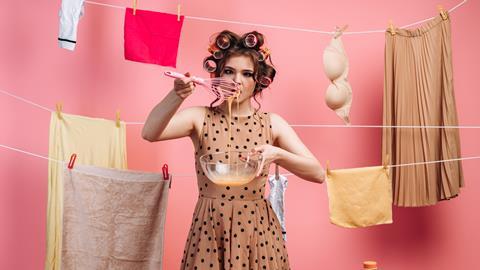Dr Belle Tindall reveals the true origins of the lie that all women were hard-wired by God to be domestic and challenges society’s expectations
I recently got to interview author and professor of Victorian literature, Karen Swallow-Prior (or, ‘The Notorious KSP’, as her social media channels entitle her), and it blew my mind. Karen has a new(ish) book out, The Evangelical Imagination (Brazos Press), in which she argues that a heap of the things that we think of as ‘Christian’ ideals are actually Victorian English ideals. Did Christianity rub off on Victorian England, or did Victorian England rub off on Christianity? It’s nearly impossible to tell, but Karen reckons it’s probably a little of both.
The origins of the domestic goddess
One of the most obvious and ingrained Victorian ideals that is still very present in Christian culture, and wider culture for that matter, is the idea of the domestic goddess.
Karen explains how, before the industrial revolution, most people worked from their homes, and therefore in partnership with their spouses and/or families. Life was inherently collaborative, and completely local. But, when the Industrial Revolution rolled around, work became something that happened elsewhere, and became a thing men did with and for other men. As a result, the desire for domestic bliss was realised. Men wanted a refuge to return to; a safe, hidden and comforting place to rest and recover.
And who was to be tasked with creating such environments? You guessed it, the women that the Industrial Revolution largely left behind. And thus, the ideal of the domestic goddess was born.
Fascinating, isn’t it?
Admittedly, I’m only skimming the surface here – urbanisation added to this, plus advancements in healthcare, the Reformation and changing perceptions of the purpose of marriage. Get the book; you won’t regret it. But, for now, here’s Karen’s point: the idea that women have this inherently domestic role to play, a role of keeping house and home, has an origin – and it isn’t biblical.
Ingrained in our culture
Now, hear me out: I am not interested in bashing the domestic aspects of life.
I love home.
I really love being at home. It’s one of the things that has surprised me the most about myself, as I’ve grown into a complete and utter homebird.
I’m looking around this hobbit-like house of mine and realising what a privilege it is to have a space (albeit a slightly damp one) that holds my life. A place that has hosted every type of day. A place where, just like the good men of old, I can take refuge. Cleaning my kitchen has become one of my favourite things to do. I’m not even joking. I kind of wish I was.
I do really like making, and being, at home. I value the domestic side of life deeply; it totally nourishes my inner life. But, that being said, I cannot tell you the pure relief I felt at Karen’s findings.
The idea that women were designed with some kind of innate skill set, and should therefore be afforded a set of life-long chores, is still an idea that’s in the cultural air we breathe. Such presumptions haven’t gone anywhere. In fact, we seem to be having a nice little resurgence of the most extreme versions of them.
Take the trend ‘Trad-wives’. These are women (slash social media influencers, which kind of muddies their point a little, but I don’t have time to get into that here) who are promoting a ‘traditional’ way of living by adopting strict gender roles within their marriages. And then there’s the recent rise of the ‘stay-at-home-girlfriends’, a TikTok trend of women, usually in their early 20s, who are forgoing further education or pursuing a career, in order to devote themselves to their high-flying boyfriends.
Both of those options are fine if stay-at-home-motherhood, wifeliness, homemaking and domestic-wizardry are your deepest desires: that’s beautiful.
Challenging the presumptions
My issue will never be that women choose to take on all of the domestic responsibilities in a home (whomever they happen to share, or not share, that home with); my issue is when it’s not a choice.
My issue is when it’s a presumption, an expectation, an aspiration that is put upon us. The word ‘domestic’ cannot be swapped in for the word ‘feminine’. If I hear of one more man looking for a ‘Proverbs 31 wife’, I may just scream. Because the only thing worse than it being a pressure put upon women by society, is the lie that it is a pressure put upon them by the One who made them.
Nope. Nuh-uh. Absolutely not.
The domestic ideal has to stop being some kind of altar that women are expected to worship at. As Karen writes: “Domesticity is about creating a home that houses a body that houses a soul that houses the Lord.”
You know whose job that is? Well, pretty much everyone’s.

































1 Reader's comment